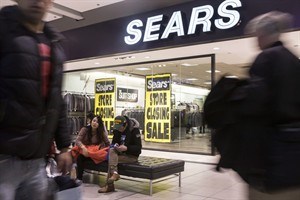
Shoppers make their way past the Sears store at the Eaton Centre in Toronto on Thursday, December 26, 2013. THE CANADIAN PRESS/Chris Young
December 27, 2013 - 6:00 AM
TORONTO - There is little doubt the retail landscape in Canada is changing as increasing numbers of big name U.S. chains shop for customers north of the border.
And, according to retail experts, just who wins the competition for the pocketbooks of Canadians in 2014 is likely to be decided by who is perceived to be offering the best deals.
"The environment overall remains very competitive. The one who can offer the best value is probably the one who's going to gain the most market share," said Brian Yarbrough, a retail analyst with Edward Jones.
"It's just the nature of where we've been lately. It seems that people are very focused on value and they're focused on deals and I think that will continue," Yarbrough said.
The competition in Canada has been intense this year as Target became the latest big American chain to invade the Canadian retail space, having now rolled out 124 stores across the country.
Domestic retailers countered by consolidating at a frenzied pace in an effort to lower overall costs and increase their buying power with manufacturers as they attempt to keep up not only with Target but also the likes of Walmart and Costco.
The grocery segment was particularly active, as Loblaws (TSX:L) struck a deal to buy Shoppers Drug Mart (TSX:SC) for $12.4 billion in cash and stock and Sobeys (TSX: EMP.A) bought the Canadian assets of U.S. grocer Safeway for $5.8 billion.
Online retailer Amazon even got into the mix, announcing it would begin delivering food directly to Canadians' doorsteps.
In other development in the retail sector, department store chain Sears Canada (TSX:SCC) announced a turnaround plan that included laying off staff and the sale of valuable assets, while Hudson's Bay Co. (TSX:HBC) continued to go upscale, striking a US$2.9-billion deal to buy Saks Inc. and bring it to Canada.
Luxury retailer Nordstrom is also set to enter Canada next year and moving into some of the locations vacated by Sears.
Canada isn't home to as many upscale retailers as the U.S. and that could present an opportunity for growth in the sector, especially as stock markets have improved, boosting confidence among wealthier consumers.
But even that environment remains competitive, Yarbrough added, noting that "even in the luxury space you're seeing discounting going on."
Meanwhile, Graeme McVie, vice-president and manager of business development at marketing and research firm LoyaltyOne, said consumers may be looking for value, but that doesn't mean they're going to see it only in the price of the goods they buy.
Stores can also encourage traffic by being well organized and stocked and by providing good service. For example, they can help clients set up the electronic devices they buy, something they wouldn't get shopping online at a discount.
Even promotions themselves aren't always what they seem, McVie added.
"The savvier retailers are using that (promotions) to grab headlines and drive overall price perceptions, but those discounts don't always apply as much as you'd like to believe."
"Not all the products are discounted to same degree and some of the prices are only available at specific times," he noted.
Ken Wong, a marketing professor at Queen's University in Kingston, Ont., said whether or not consumers come out as the winners in the current price-driven environment depends on what they're looking for.
"If what you look for is low price then it is unquestionably a good thing, because bigger stores, on the range of merchandise that they carry, always have lower prices," said Wong.
"But you're not going to find more esoteric, more specialty type products in a big box store relative to a local store, nor are you usually going to find in a big box store products that are unique to local tastes."
What smaller businesses can offer are those local products, more personal service and, in some cases, more convenient locations.
"Where small stores get into trouble is when they try to go head-to-head with a big box store, especially on price, because they just can't sustain their operation at that margin, their costs are too high," Wong said.
Fiona Story of the Yellow Pages Group, which has been working to promote local business through an event called Shop The Neighbourhood, agreed that competitive pressures mean small businesses have to get more creative to lure customers.
"There's actually a need for small businesses to up their visibility and take advantage of other channels, particularly digital marketing channels that they may not have necessarily been considering before," Story said.
And deals offered by local retailers don't always have to be huge, she said. For example, during one recent marketing event the store's deal was a free balloon for anyone who visited, and people went.
"There is a desire to support the local businesses in your neighbourhood, but people are busy so sometimes we just need that recall or reason to get out there and to do it," she said.
News from © The Canadian Press, 2013